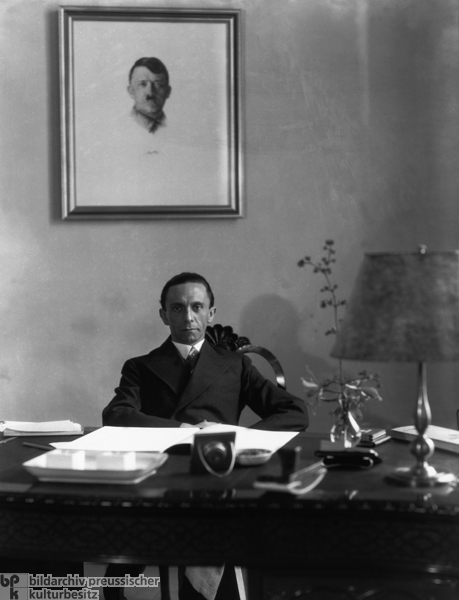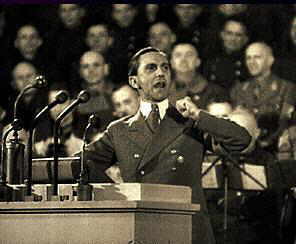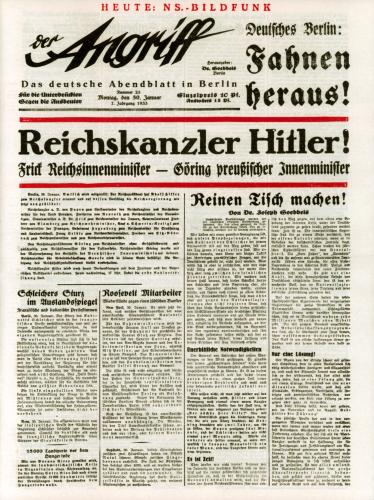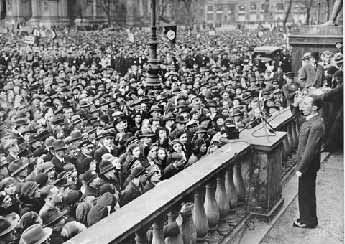Search our Archives:
» Home
» History
» Holidays
» Humor
» Places
» Thought
» Opinion & Society
» Writings
» Customs
» Misc.
|
Hitler’s Misanthrope
By Peter Bjel © 2011
Hitler’s
Third Reich embodied propaganda because it was the regime’s
lifeline. Central to Nazi propaganda was the misanthropic figure of
Paul Joseph Goebbels. He put aside all inhibitions and
individuality, taking on the role within the Nazi façade that
he had constructed and institutionalized as Propaganda Minister.
This is the first of three articles.
The Nazi period in Germany
continues to stand out as a case in which propaganda propped up the
very regime that had created it. Propaganda, and its manifestations
and usage, in itself, are not unique in modern states, but the Third
Reich embodied propaganda because it was the regime’s lifeline.
As the late historian
Joachim C. Fest put it, “Carrying it to an extreme, one might
say that National Socialism was propaganda masquerading as ideology,
that is to say, a will to power which formed its ideological theorems
according to the maximum psychological advantage to be derived at any
given moment, and drew its postulates from the moods and impulses of
the masses, in the sensing of which it was abnormally gifted.”1
The use of ubiquitous
propaganda was crucial for Nazi rule, and Paul Joseph Goebbels, its
chief proponent and driver, is regarded as the second most important
figure in the Third Reich after Hitler in part for this very reason.2
Nazi propaganda was a masquerade and disseminator of Nazi ideology,
without which the events and manifestations emanating from the Third
Reich could not have happened. When, in April 1945, this apparatus
fell apart, its parent regime’s fate was not long in following.
This three-part series of
articles is concerned with three aspects of the Nazi propaganda
phenomenon and its centrality to the Third Reich’s policies and
ideology. No analysis of the subject is complete without a
consideration of the figure Goebbels, as the Third Reich’s
propaganda scope and apparatus owed its genesis to him. A unique
figure in the Nazi hierarchy, endowed with remarkable intelligence
that paralleled his countering sense of physical inadequacy, he
nonetheless channelled his energies and allegiance to National
Socialism, supremacy and his ‘Fuehrer,’ eventually
meshing with the very façade and political masquerading he had
created.
A professionally trained
intellectual himself, the Propaganda Minister was fascinated by
culture, and once he was in the position to do so and the
circumstances so warranted, crucially went about creatively and
subtly disseminating the Nazi ethos via cultural routes –
through film, theatre, literature, visual art, music, and the press.
At the same time, Goebbels sought to systematically undermine, censor
and eliminate cultural creativity that precluded contrariness or
dissent in the arts.
In the realms of what has
come to be known as the geopolitical arena, Goebbels remained “the
brain behind this manipulation of minds,” and his propaganda
extended, working at spewing forth the political, military and,
eventually, racial policies that have all come to define Nazism in a
broader historical perspective.3
At its centre was militant altruism, epitomized but not solely
confined to the Horst Wessel legend: the absence of individuality and
an emphasis on collective strength and self-sacrifice for nation, the
Fuehrer and Vaterland that faced peril and danger. Myths
became reality, underpinning Nazi policies and conduct. Hitler
became a divine force, expansionism and world war became defence, and
even genocide, however much it was meant to be concealed from
citizenry, stemmed from this same urgency of necessity and
progression.
* * *
According to Fest, Paul
Joseph Goebbels, editor of the early Party organ Der Angriff,
Gauleiter of Berlin, Minister for Propaganda and Enlightenment,
Minister and Plenipotentiary for Total War – and a host of
other positions he acquired by his position in the central Nazi
governmental hierarchy and Hitler’s inner circle – was an
integral personality to Nazism. He was “…one of the few
real powers in the movement’s leadership, not merely a
figurehead drawn into the light of history ‘in the wake of the
victorious cause.’”4
Outsiders that witnessed
his conduct and roles within the Nazi movement, like Sir Neville
Henderson, the British Ambassador to Germany from 1933-1939, had this
to say:
The ‘little doctor’ was probably the most intelligent,
from a purely brain point of view, of all the Nazi leaders. He never
speechified; he always saw and stuck to the point; he was an able
debater and, in private conversation, astonishingly fair-minded and
reasonable. Personally, whenever I had the chance, I found pleasure
in talking to him. In appearance and in character he was a typical
Irish agitator….When, however, he was on a public platform or
had a pen in his hand no gall was too bitter and no lie too blatant
for him.5
This was a man that was
among the “practitioners and technicians of totalitarian rule”
grouped in Fest’s work: capable of consciously acting and
thinking for himself, as he did before his encounter with National
Socialism, but also fully capable of putting aside all individual
inhibition to take on the role within the Nazi façade he had
constructed and institutionalized as Hitler’s Propaganda
Minister. Goebbels had a duality about him that benefited the Nazi
movement. “Even at his most fanatical, Goebbels was always the
dispassionate realist, observing, with detached, professional
expertise, the effect of his own carefully rehearsed mob oratory.”6
His origins in the
Rhineland town of Rheydt were relatively underprivileged, made worse
by a childhood bout of what later was identified as osteomyelitis,
leaving his right foot underdeveloped and clubbed. This began a
lifelong insecurity and physical inferiority complex that would grow
to shape the nature and extent of his misanthropy and the ease with
which he channelled these energies to his responsibilities within the
Nazi movement.7
His socio-economic
origins, a lapsed Catholicism that had once played an important part
in his life… Rejection from the military in the First World
War on account of his clubfoot… An eventual Doctorate of
Philosophy from Heidelberg, on 21 April 1921, that was earned at the
beginning of the interwar period of economic meltdown in Germany,
forcing him into menial work… All of these things critically
shaped Goebbels before, and even far into his involvement with the
fledgling National Socialists.8
Upon his involvement in politics, his past experiences emboldened
him to excel and become an opportunist:
Because his intellectualism and his physical deformity combined to
make him particularly vulnerable among his rivals for power, he
developed into an uninhibited opportunist with an exceptional nose
for the power relationships in his circle. In the internal conflicts
of direction within the party Goebbels, by virtue of his temperament
and his intellectual consistency, often found himself on the
ideological wing, yet he always managed to switch in good time to the
side of the majority.9
In 1925, after having
attended some of the Nazi Party’s rallies and being told about
them from friends who joined, he enlisted in the movement shortly
after it was outlawed following the failed “Beer Hall Putsch”
of November 1923. The Nazis were an underground movement that had
split into regions, according to German geography. The leader of the
movement’s Rhineland wing, Gregor Strasser, needed assistance
in Elberfeld, and it was here that Goebbels began working for the
Nazis and joined the party.10
Soon, he heard Hitler speak at a conference in Bamberg, and was
converted to Hitler’s Nazism, much to Strasser’s
chagrin.11
For Goebbels, what would
become his own unique stamp to the propagating of Nazism for all of
Germany fleshed out upon his involvement with Hitler. “The
secret of Goebbels is that he must always be loved and admired, a
feminine trait in his nature which was so strongly pronounced that he
loved only those who openly and emphatically loved him. Hitler was
astute enough to discover and exploit this weakness, whereas both
Kaufmann [another of Goebbels’ acquaintances that introduced
him to Nazism] and the Strassers grew weary of his intrigues and
tantrums.”12
Practicality crept into
such an arrangement, for there was a mutual reliance at work between
Hitler and Goebbels. “Hitler, and the cult of Hitler, would
supply him with the central ideal, the necessary conviction which was
lacking in his own mentality, and around which the brilliant
impresario could organize the ritual of devotion.”13
On 26 October 1926, Hitler made him Gauleiter of Berlin, a post that
he was to maintain until the end of the Second World War.14

Goebbels
at his desk.
From the period of October
1926, to the Nazis’ electoral victory and Hitler’s
becoming Chancellor on 30 January 1933 (a time period that the Nazis
would collectively remember as the ‘time of struggle,’ or
Kampfzeit), Goebbels’ main task was to win Berlin over
to Nazi support. This was a difficult task, given that the German
Communists had a firm foothold in the city.
In light of Hitler’s
electoral successes in Berlin, Goebbels two principle means by which
he accomplished this task was by publishing and disseminating a Nazi
Party weekly, Der Angriff (“The Attack”), and
by honing the craft of image-making and myth-converting into the
propaganda Hitler had demanded while dictating Mein Kampf, and
which he would be in charge of governing after 1933.
To do this, Goebbels
utilized his own eloquent oratory, often deliberately set in working
class districts of Berlin to destabilize Communist meetings,
provoking and inciting street and beer hall riots – often with
the help of the steadily growing ‘Sturmabteilung’ (SA)
paramilitaries – which he then twisted and portrayed as
non-Nazi aggression. “He purged the local party, streamlined
the administration, and maintained Nazi power in the city by
effective propaganda, frightening demonstrations of power and
unscrupulous persecution of scapegoats.”15
Like Hitler, Goebbels
practiced his political, oratorical and propagandistic skills,
learning the contours and subtleties of audiences and listeners that
he could then grasp:
He always considered his audience first – how to affect them,
how to incite them. He developed little or no personal emotion while
speaking, but he gave everything he had, physically and vocally, to
rouse emotion in his audience. He pushed his fine, sonorous voice to
its limits, and the effort of speaking to mass audiences for
prolonged periods of up to two hours cost him a great deal….
In this respect he was the reverse of Hitler. Goebbels always
calculated his effect, and to those he knew well he was prepared to
boast about this, saying, for example, before a meeting, ‘Well,
which record shall I put on now?’ He also cultivated the
capacity to adapt himself to audiences, particularly those likely to
be hostile. He became, in other words, completely professional, the
master of his audience, proud and vain of his ability to establish
himself immediately with the people in front of him. His effrontery
dazzled his own adherents and those who came to his meetings out of
curiosity. He was a success.16
Fest described Goebbels’
responsibilities during this time as both bestowed on him by Hitler,
but also as a “self-imposed task” to rally his listeners
to Nazism: “With diabolical flair, continually thinking up new
tricks, he drove his listeners into ecstasy, made them stand up, sing
songs, raise their arms, repeat oaths – and he did it, not
through the passionate inspiration of the moment, but as the result
of sober psychological calculation at the desk.”17

“With
diabolical flair, continually thinking up new tricks, he drove his
listeners into ecstasy.”
The weekly paper Der
Angriff, which had a purposeful value only until 1933, after
which it quietly dissolved, was significant during these
formative years. On 5 May 1927, Goebbels was banned by the Berlin
police from speaking because of the spate of violent political
clashes between the SA and Communists that had taken place. Devising
an alternative way of keeping in contact with Nazi Party members, he
came up with the idea of a weekly newspaper: “All of a sudden I
had a brain wave: surely there could be one name only for our paper:
Der Angriff. The very name had its propagandistic value, since to
attack was really all we wanted.”18
Under Goebbels and Julius
Lippert, who became the paper’s editor-in-chief, Der Angriff
became an alternative to the existing Nazi press organs, notably
Der Stuermer, in that it sought to define, first and foremost,
what National Socialism meant and, in a morale-boosting intent, that
it was still active in Berlin despite the police ban.19
After the ban on Goebbels was retracted, the paper continued to
function, as per Goebbels’ intention to win Berlin over to the
Nazis. It was often the epicentre of intense attacks against the
Weimar government then in power, and several prominent anti-Nazi
figures in the government, always casting them in a negative light.
The paper glorified and propagated fallen SA or Nazi Party figures,
portrayed Hitler as a populist and ally of the working class, and
articulated the ubiquitous anti-Semitism that was a staple of the
Nazi movement.
By 1930, “Der
Angriff had helped to keep the party together during the
difficult months of the prohibition. In addition, the paper had
grown from its relatively modest origins to become the second largest
Nazi-operated newspaper. This was quite an accomplishment.”20
It was yet another sign of the future that Goebbels used Der
Angriff in the political conquest of Berlin, and attested to the
abilities he had honed in these formative years. “He adapted
his propaganda to local conditions. Further, if the Nazis really
wanted to create a mythical Volksgemeinschaft [people’s
community, though in Nazi ideology the term meant a greater German
nation-state of ideological and racial oneness], they would need the
support of Germany’s proletariat. In this respect, Goebbels
was looking ahead to the years after Hitler came to power. The
Gauleiter clearly believed that the Third Reich was approaching. He,
with the aid of his newspaper, was able to convince tens of thousands
of Berliners of this as well.”21
After the Nazi victory in
January 1933, Goebbels, newly minted in March of that same year as
the Minister of Propaganda and Enlightenment, had grown. The Nazi
victory was a personal victory for him as much as it was for the
movement, but it had now ushered in a new period and responsibility.
Boastfully, the Propaganda Minister reported that his tireless
campaigning and efforts “…had not only operated directly
by winning over millions of supporters; equally important was its
effect in paralysing opponents. Many had become so tired, so
fearful, so inwardly despairing as a result of his onslaughts that in
the end they regarded Hitler’s chancellorship as fated.”22
Goebbels himself penned:
We are not of the opinion that the struggle is over; no, tomorrow
morning we shall begin with the new work and the new struggle. We
are firmly convinced that the day will come when in Germany not only
the National Socialist movement but an entire Volk will rise
up, an entire Volk will recall its ancient values, and an
entire Volk will set out marching toward a new future. For
work and for bread, for freedom and for honor we must struggle, and
we will see this struggle through, for we believe that it will bring
blessings and happiness to the German nation…. One can
rightfully say: Germany is awakening.23
He never allowed his newly
acquired control of Berlin – and, dare we say, Germany itself –
to be relinquished.24
After the Reichstag Fire of 27 February 1933, an ailing President
Paul von Hindenburg acquiesced to Hitler the permanent state of
emergency that granted him dictatorial powers and a suspension of
civil liberties via the Enabling Act. A wave of arrests swept
through Germany, and the Communist movement was decimated.

An
issue of Der Angriff.
Goebbels, in Der
Angriff, railed: “Now rise up, German nation! Rise up and
cast your judgment! On March the fifth let God’s punishment
smite the Red world plague! Hitler wants to act! Hitler will act!
Give him the power to do so!”25
At this point, according to the biographer Viktor Reimann, Goebbels
underwent a political transition and epiphany of his own. Following
the death of Hindenburg, the 30 June 1934 anti-SA purges, and
Hitler’s ultimate rise to power, Goebbels saw that the
revolutionary tactics that he had utilized in the pre-1933 days had
become antiquated. That which Goebbels had mythologized had now
become reality, making his past role obsolete. Yet the opportunism
he had acquired was alive and well: “Henceforth he would
simply carry out his master’s orders, regardless of whether he
was asked to play the sweet tunes of peace or blow the harsh trumpet
calls of war.”26
Goebbels’ drive to
prove himself, whether in the company of his family, his many lady
friends, Hitler, or his fellow Nazis, were open and graphic visuals
attesting the depths to which he had descended in order to get even
with his insecurities and play up to the never-ebbing misanthropy
that drove him. Reimann writes that, in the mid-1920s, when
Goebbels’ radical political consciousness was still in its
infancy, there was a time when he had sympathized with the Bolshevik
Revolution and looked up to both Lenin and Stalin as revolutionaries,
thereby denoting his socialist tendencies.
During his time with the
Strasser wing, he had written that both Bolshevik Russia and
socialism were rejections of materialism and the Western worship of
capitalism. “That is why we look toward Russia, because she is
the most likely to show us the way to socialism. She is our most
natural ally against the diabolical temptations and corruption of the
West….we can see in the building of a truly national and
socialist Russia the beginnings of our own national and socialist
existence.”27
Now, under Hitler’s
tutelage, Goebbels had made the ultimate declaration of political
apostasy and partook in the persecution of Communist elements in
Germany. Similarly, earmarks of his eventual cultural apparatus
would extol the necessities and virtues of taking away life unworthy
of life via sterilization and, eventually, the Third Reich’s
euthanasia program. These latter items were laden with irony, given
that Goebbels, their chief proponent, was constantly forced to
wrestle with the self-consciousness he had because of his short
height and physical disability and the stigmas that seemed to follow
him everywhere because of it.28

Goebbels
was forever plagued by a physical inferiority complex.
Anti-Semitism permeated
virtually every ordinance and action sanctioned by the Nazis.
Goebbels did not grow up in an atmosphere of anti-Semitism. In his
university days, two Jewish professors of his, Professors Gundolf and
Waldberg, had stood out. According to Ralf Georg Reuth, a recent
biographer, Goebbels “praised both…to the skies, and
even when he began to see Jewry as the world’s downfall, his
boundless hatred did not extend to these men personally.”29
Yet, he partook in the Nazis’ sanctimonious, anti-pacifistic
and anti-Semitic book burnings, but not without fear that an astute
observer would see him there and “cause his enemies to
resurrect his past.”30
Ultimately, Goebbels’
most enduring mark was in the principles of propaganda that he
extolled throughout his tenure, and in his own writings. Writing a
few years after the Second World War, Leonard W. Doob outlined
nineteen essential principles that, at one point or another, Goebbels
utilized and mastered. They ranged from the credibility,
centralization, and timing of propaganda, to the analysis and
assessment of enemy propaganda; the uses of censorship and
facilitation of propaganda to political leaders, to the simplicity of
propaganda via “distinctive phrases or slogans”; the
keeping in check of false hopes and bolstering “an optimum
anxiety level,” to its jingoist and “counter-tendencies”
potential.31
* * *
Doob
stipulated a warning from history that turned out to have never
vanished. “Whether the legacy [of Goebbels] has been reliably
deduced is a methodological question. Whether it is valid is a
psychological matter. Whether or when parts of it should be utilized
in a democratic society are profound and disturbing problems of a
political and ethical nature.”32
The misanthropy of Goebbels, channelled, as it was into the Nazis’
rise to power and their policies of conquest and devastation,
appeared unreal at the time they happened. It remains an open
question as to whether or not it remains so unreal in the present.
The ways in which Goebbels’ propaganda played out in places
like culture and the arts is the subject of the second installment in
this series of articles.
-
Peter Bjel is a freelance writer and teacher candidate, and holds
degrees in Politics and History from the University of Toronto. He
can be reached at peterbjel@hotmail.com
.
This is the first of three articles about Goebbels, propaganda and
the Third Reich.
NOTES:
1
Joachim C. Fest, The Face of the Third Reich (New York:
Pantheon Books, 1970), p. 83.
2
See Ibid., p. 84, for this. Goebbels’ many biographers,
including those cited here, also corroborate it.
3
Ibid., for quotation source.
5
Quoted in Roger Manvell and Heinrich Fraenkel, Dr. Goebbels: His
Life and Death (New York: Simon and Schuster, 1960), p. 143.
6
Hugh Trevor-Roper, “Hitler’s Impresario.” New
York Review of Books 25, 9 (1 June 1978), HTML.
7
Gordon A. Craig, “The True Believer.” New York Review
of Books 41, 6 (24 March 1994), HTML. This is a common theme in
the biographies of Goebbels cited.
8
For these pointers, see Robert E. Herzstein, The War that Hitler
Won: The Most Infamous Propaganda Campaign in History (New York:
G.P. Putnam’s Sons, 1978), pp. 31, 37, 41.
9
Fest, The Face of the Third Reich, p. 87.
10
Manvell and Fraenkel, Dr. Goebbels, p. 38.
11
Dietrich Orlow, “The Conversion of Myths into Political Power:
The Case of the Nazi Party, 1925-1926.” The American
Historical Review 72, 3 (April 1967): pp. 906-924, at p. 923,
for Goebbels’ personal change in convictions and allegiance.
12
Manvell and Fraenkel, Dr. Goebbels, p. 50.
13
Trevor-Roper, “Hitler’s Impresario.”
14
Manvell and Fraenkel, Dr. Goebbels, p. 42.
15
Trevor-Roper, “Hitler’s Impresario.”
16
Manvell and Fraenkel, Dr. Goebbels, p. 74.
17
Fest, The Face of the Third Reich, p. 92. He adds: “In
truth, the ‘little Doctor’ with the tormenting feeling
of physical inadequacy was capable of bending the masses to his will
and making them available for any purpose; he could, as he boasted,
play upon the national psyche ‘as on a piano’”
(Ibid).
18
Quoted in Ibid., p. 76.
19
See Russell Lemmons, Goebbels and ‘Der Angriff’
(Lexington: University Press of Kentucky, 1994), p. 49, for
details of this early purpose.
22
Fest, The Face of the Third Reich, p. 92.
23
Quoted in Ralf Georg Reuth, Goebbels: A Biography (New York:
Harcourt Brace & Company, 1993), pp. 164-165.
24
Trevor-Roper, “Hitler’s Impresario.”
25
Quoted in Reuth, Goebbels, p. 169.
26
Viktor Reimann, Goebbels: The Man Who Created Hitler (Garden
City, NY: Doubleday, 1976), p. 217. On Goebbels’
perceptions of propaganda’s purposes in the Weimar period, see
Herzstein, The War that Hitler Won, p. 60.
27
Quoted in Reimann, Goebbels, p. 45; for more on this early
socialism, see pp. 45-47.
28
Here, I am referring to the 1935 film Das Erbe, as well as
the 1936 piece Erbkrank.
29
Reuth, Goebbels, p. 182; earlier, Herzstein, The War that
Hitler Won, pp. 61-64.
30
Reuth, Goebbels, p. 182. For further on the likely
opportunistic nature of Goebbels’ anti-Semitism, see Fest, The
Face of the Third Reich, pp. 93-94.
31
See the article by Leonard W. Doob, “Goebbels’
Principles of Propaganda.” The Public Opinion Quarterly 14,
3 (Autumn 1950): pp. 419-442, for all nineteen ‘principles.’
~~~~~~~
from the September 2011 Edition of the Jewish Magazine
|
|
Please let us know if you see something unsavory on the Google Ads and we will have them removed. Email us with the offensive URL (www.something.com)
|





|